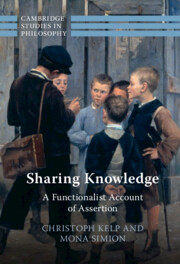Refine search
Actions for selected content:
8 results

Sharing Knowledge
- A Functionalist Account of Assertion
-
- Published online:
- 18 November 2021
- Print publication:
- 18 November 2021
Chapter 8 - KRA and Epistemic Contextualism
- from Part III - Knowledge and Language
-
- Book:
- Sharing Knowledge
- Published online:
- 18 November 2021
- Print publication:
- 18 November 2021, pp 159-176
-
- Chapter
- Export citation
Chapter 5 - FFAA and KRA
- from Part II - FFAA
-
- Book:
- Sharing Knowledge
- Published online:
- 18 November 2021
- Print publication:
- 18 November 2021, pp 98-117
-
- Chapter
- Export citation
Chapter 3 - KRA and Sufficiency
- from Part I - KRA
-
- Book:
- Sharing Knowledge
- Published online:
- 18 November 2021
- Print publication:
- 18 November 2021, pp 51-70
-
- Chapter
- Export citation
Chapter 2 - Problems for KRA
- from Part I - KRA
-
- Book:
- Sharing Knowledge
- Published online:
- 18 November 2021
- Print publication:
- 18 November 2021, pp 30-50
-
- Chapter
- Export citation
Chapter 1 - The Case for the KRA
- from Part I - KRA
-
- Book:
- Sharing Knowledge
- Published online:
- 18 November 2021
- Print publication:
- 18 November 2021, pp 11-29
-
- Chapter
- Export citation
Chapter 7 - KRA and Constitutivity
- from Part III - Knowledge and Language
-
- Book:
- Sharing Knowledge
- Published online:
- 18 November 2021
- Print publication:
- 18 November 2021, pp 139-158
-
- Chapter
- Export citation
Introduction
-
- Book:
- Sharing Knowledge
- Published online:
- 18 November 2021
- Print publication:
- 18 November 2021, pp 1-8
-
- Chapter
- Export citation
